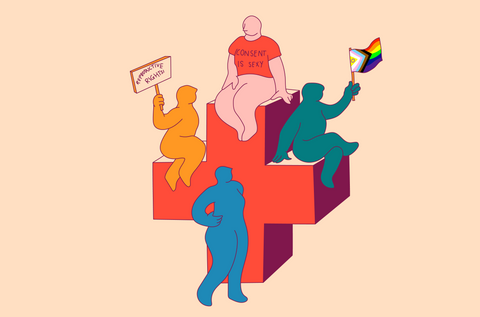If you’ve gone online or picked up a magazine recently, you might have encountered the term ‘sex positive’ or ‘sex positivity’. It’s a term that might seem pretty simple, but we think it’s worth a deeper look.
Although the term can be defined differently by different people, and each person’s definition is valid; at its core ‘sex positivity’ refers to a positive or enthusiastic attitude towards sex.
Someone who is ‘sex positive’ might enjoy having sex, be interested in learning or trying new things in the bedroom, and be happy to talk about sex at appropriate moments. More than just that, though, sex positivity can encompass a broad range of beliefs and attitudes to do with sex, gender, and sexuality.
Here are a few common concepts related to sex positivity.
The belief that everyone should have access to sex education and reproductive healthcare
Sex can be fun and really exciting, but let’s not forget that around the world many people are unable to access adequate sex education and reproductive healthcare. Someone who is sex positive may consider it really important that people have access to things like period products, contraception, reproductive healthcare including abortion, and sex education.
The belief that people should be free to express themselves, regardless of gender or sexuality
Sex positivity can have a lot in common with LGBTQIA+ rights! Someone who is sex positive might care a lot about everyone having the right to express themselves, live authentically, and love who they want to love.
The belief that all bodies should be celebrated
Even though today’s media is a lot more diverse than it was twenty years ago, it’s still hard to escape the narrative that our bodies have to look a certain way in order to be considered attractive. Although attraction is about more than just sex and bodies don’t exist solely to be sexual objects, a sex positive person might believe that all bodies should be celebrated and seen as sexy and attractive.
An interest in learning about different sexual practises
Someone who’s sex positive might be interested in learning more about different sexual practises, even if they don’t necessarily integrate those things into their own sex lives. Sex positivity often denotes an open mind, although it’s important to remember that just because someone’s sex positive, it doesn’t mean they’re ‘up for anything’ or that they have no boundaries.
A desire to communicate their needs, wants, and boundaries
We always say that communication is key in the bedroom, and someone who’s sex positive will likely agree with us! A person who believes in sex positivity might place a lot of importance on being able to communicate with their partner about what they want and need in a relationship, and they’ll also likely want to hear about what their partner wants and needs too. They may also find it important to communicate their boundaries as well.
A belief in practising safer sex, in all its forms
It’s a common assumption that ‘safer sex’ is a synonym for ‘protected sex’ or ‘sex with contraceptives’, but this isn’t quite true. ‘Safer sex’ can encompass a lot—contraceptives, yes, but also sexual hygiene, safe use of substances in sex, and ongoing consent. We think these things are vital, and someone who is sex positive will likely agree with us.
Sex positivity can encompass all of these things and more, which is why some people find it a really useful term to describe their outlook.
However, some have argued that sex positivity needs a counter: sex neutrality.
Michelle Hy writes that, “The explosion of sex positive spaces and communities is awesome, but sometimes it can leave some people feeling like they may be broken or labelled a ‘prude’ or that they may not be living up to some progressive standard of liberation if they're not always super gung-ho about sex.”
For some, sex positivity can feel way too positive—so Hy suggests sex neutrality as an alternative. Sex neutrality, she says, isn’t about disliking sex or feeling a shame around it, but it also doesn’t “centre sexual experiences as a part of self-empowerment”. It sees sex as a neutral thing: not inherently good, not inherently bad, just what we make of it.
Sex neutrality may not resonate for all as sex is an expression of identity, pleasure, exploration and joy—the very reason many people have sex is to feel good. Though for others this outlook may feel validating, and one that’s worth discussing here.
Now we’re keen to hear your thoughts! Do you see yourself as sex positive, sex neutral, or something else entirely? And are your definitions different to ours, or similar? Let us know by tagging us on socials and sharing your opinions with us.







